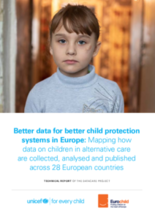Children need stable and safe relationships with caring adults to thrive, and such relationships are far more likely to be created in a family environment. Those growing up in alternative care have very often experienced significant trauma before being placed in care. Residential care, in particular, can expose them to all the risks associated with social exclusion if it is not equipped to give them the tailored support they need.
That is why it is important to know the proportion of children placed in residential care compared to those in placed in formal family-based care. This would provide an instrumental indicator of progress towards the goal of ensuring that every child in alternative care receives high quality, inclusive, family and community-based care. This would shed light on the effectiveness of deinstitutionalisation reforms and, in combination with other indicators, speak directly to the common EU child rights agenda.
The protection of the rights of the child is one of the objectives of the European Union (EU) and the EU is committed to reducing child poverty and social exclusion of children, including children in alternative care. This was reiterated at the Porto Social Summit in May 2021. Also in 2021, several new EU policy initiatives have brought renewed momentum to deliver on these commitments in the coming years: the EU Action Plan on the European Pillar of Social Rights, the EU Strategy on the Rights of the Child, the European Child Guarantee, and the European Strategy for the Rights of People with Disabilities. As well as reinforcing commitments to child rights, these policy initiatives foresee the development of frameworks to monitor and evaluate their implementation at EU and national level. This opens an important window of opportunity to inform these frameworks and to make a strong case for the integration of indicators on children in alternative care into EU- and national-level statistical frameworks and systems.
The DataCare project is a joint initiative of Eurochild and the UNICEF Europe and Central Asia Regional Office (ECARO). Launched in March 2020, the project has mapped alternative care data systems across the 27 Member States of the EU and the United Kingdom (UK). The aim has been to move towards a more transparent, common approach to data collection and reporting on this area across Europe. The survey found that 19 of the 28 countries surveyed are either reforming, or have recently reformed, their data system on alternative care. This signals a clear awareness of the need for better data and a keen interest in working to improve data systems on children in alternative care across the region.
This report was conceptualised jointly by Eurochild and the UNICEF Europe and Central Asia Regional Office (ECARO) and builds on the Eurochild report on alternative care in Europe published in 2009.

